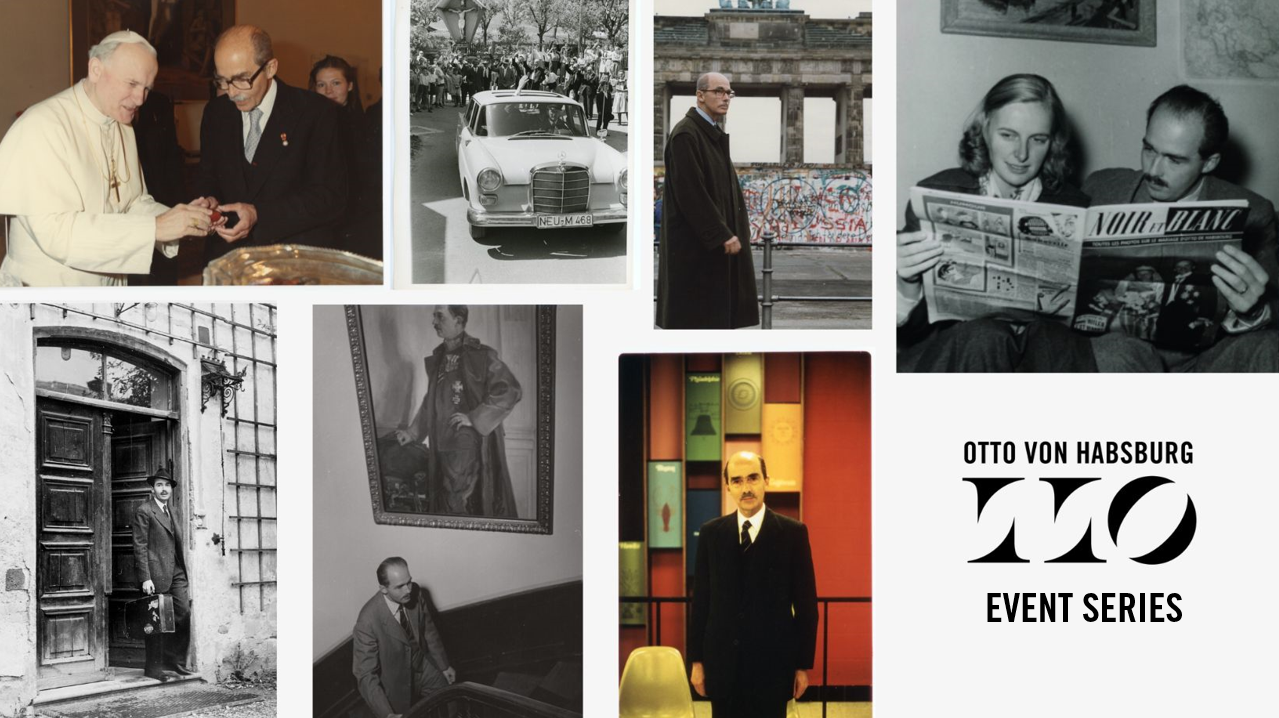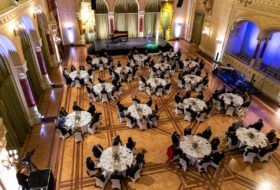Our opening event was held in Várkert Bazár: the photo exhibition entitled From Palace to Parliament – Otto von Habsburg was born 110 years ago – presented the life and professional career of the last heir to the Habsburg dynasty for two months in the gardens of the eastern part of the Buda Castle. The renowned British historian Martyn Rady, Professor Emeritus of the Institute of Slavonic and East European Studies at the University of London, and the author of The Habsburgs. To Rule the World opened the event.
Also aimed at a broad audience, we hosted a joint evening with the Rubicon Institute on 20 October. On this occasion, Gergely Prőhle, Director of our Foundation and Gergely Fejérdy, our Deputy Scientific Director, answered questions from Gábor Péterfi, a research fellow of the Rubicon Institute, about the work, historical significance and ideological impact of the last Hungarian heir to the throne. In 2023, in cooperation with the Foundation, the journal plans to publish a thematic issue on Otto von Habsburg.
Our Foundation has done its best to commemorate our namesake’s intellectual and political legacy in a worthy form in many cities and opinion-forming centres across the continent. It was in this spirit that we presented our Life and Heritage exhibition
at the Liszt Institute Hungarian Cultural Centre in Zagreb, welcomed by Gordan Grlić Radman, Croatian Minister for Foreign and European Affairs;
in Florence, at the European University Institute, with a lecture at the associated conference by Professor Renaud Dehousse, President of the European University Institute, Aline Sierp, Lecturer at Maastricht University, Alain Lamassoure, former French Minister for European Affairs, Enikő Győri and Tibor Navracsics;
in Brussels, in the most visited hall of the European Parliament building, in cooperation with the Hanns-Seidel-Stiftung. Speeches were delivered by Markus Ferber, President of the CSU Foundation, François-Xavier Bellamy, French Republican MEP and György Hölvényi, MEP of the Christian Democratic People’s Party;
at the House of Europe in Paris, with Alain Lamassoure, Jean-Louis Bourlanges, Chairman of the Foreign Affairs Committee of the French National Assembly and former Member of the European Parliament, and George von Habsburg, Ambassador of Hungary to Paris, son of the former Crown Prince;
at the round table discussion at the Hanns Seidel Foundation headquarters in Munich, with presentations by former Federal Finance Minister Theo Waigel and MEP Ernő Schaller-Baross;
at the Hungarian Embassy in Vienna, where Ambassador Andor Nagy was joined by Wolfgang Schüssel, former Austrian Federal Chancellor, Cyril Hortobágyi OSB, Archpriest of Pannonhalma and Gergely Gulyás, Minister in charge of the Prime Minister’s Office, among others, to address the large audience.
Furthermore, during a prayer service attended by members of the Hungarian Parliament, they commended Otto von Habsburg, who stood up for Hungarian causes as a Member of the European Parliament and can still be seen as a role model of authentic Christian politics.
It was through the ties between Elemér Lónyay and the Habsburgs that our exhibition reached Bodrogolaszi. In the village, the memory of the later husband of Crown Prince Rudolf’s widow, a knight of the Order of the Golden Fleece, one of the most loyal legitimists of the interwar period, was recalled.
We organised a conference under the title Positioning Christianity in Today’s Europe, which aimed to understand the current state of Christianity in Europe, to take stock of the different denominational and national contexts and to analyse the prospects of the European churches. To provide a complete picture, we have not only sought to focus on recent empirical findings but also to allow representatives of the different Christian confessions to present, based on their research and experience, the specific aspects that are essential to understand the current situation and the methods that can counteract the above-mentioned trends. In addition to social science analysis and ecclesial strategies, the consultation was complemented by political reflections. We considered that a forward-looking discussion on the situation of the churches and the role of Christianity in Europe is particularly relevant at a time when many European countries are conducting censuses to (also) assess their populations’ religious and denominational distribution.
Our Foundation paid tribute to Otto von Habsburg’s birthday with a conference and a banquet. The conference, entitled Conservative Minds, was held at the University of Public Service, with the participation of prominent American figures of the intellectual movement that had a decisive influence on the universal history of the 20th and 21st centuries: Edwin J. Feulner, founder and former director of The Heritage Foundation, Jeffrey O. Nelson, president of the Russell Kirk Center for Cultural Renewal, and Andrew Bremberg, president of the Victims of Communism Memorial Foundation and former US diplomat. Tamás Magyarics, historian, provided the historical context, while János Csák, Géza Jeszenszky, Réka Szemerkényi and Balázs Mártonffy outlined the geopolitical context of the three decades since the fall of communism. Speaking about the ethical fundamentals of the former heir to the throne’s actions, Feulner recalled that the acceptance of the dignity and uniqueness of a man open to transcendence came from Otto von Habsburg’s Catholic faith. His loyalty and trust in Rome made him “profoundly humane, thoroughly Christian and unnervingly optimistic”.
Our commemorative year ended in Gödöllő. At the end of November, we opened the exhibition of the Regional Archives and Library of Madeira at the Royal Palace, and we also held a double book launch to recall the final years of the life of Blessed Charles IV. Our volume, Goodwill and Misfortune, published in collaboration with the VERITAS Historical Research Institute and Archives, focuses on the last Austrian emperor and Hungarian king; the other, Exiled in Madeira, draws on personal memories to paint a portrait of a father, husband and, in the face of his growing illness, a man bidding farewell to life. His example was a life-changing experience for his son Otto von Habsburg. The memory of his father remained with him in the ideas he inherited from him – and in the photograph he kept on his desk.
We would like to thank everyone for their participation!


